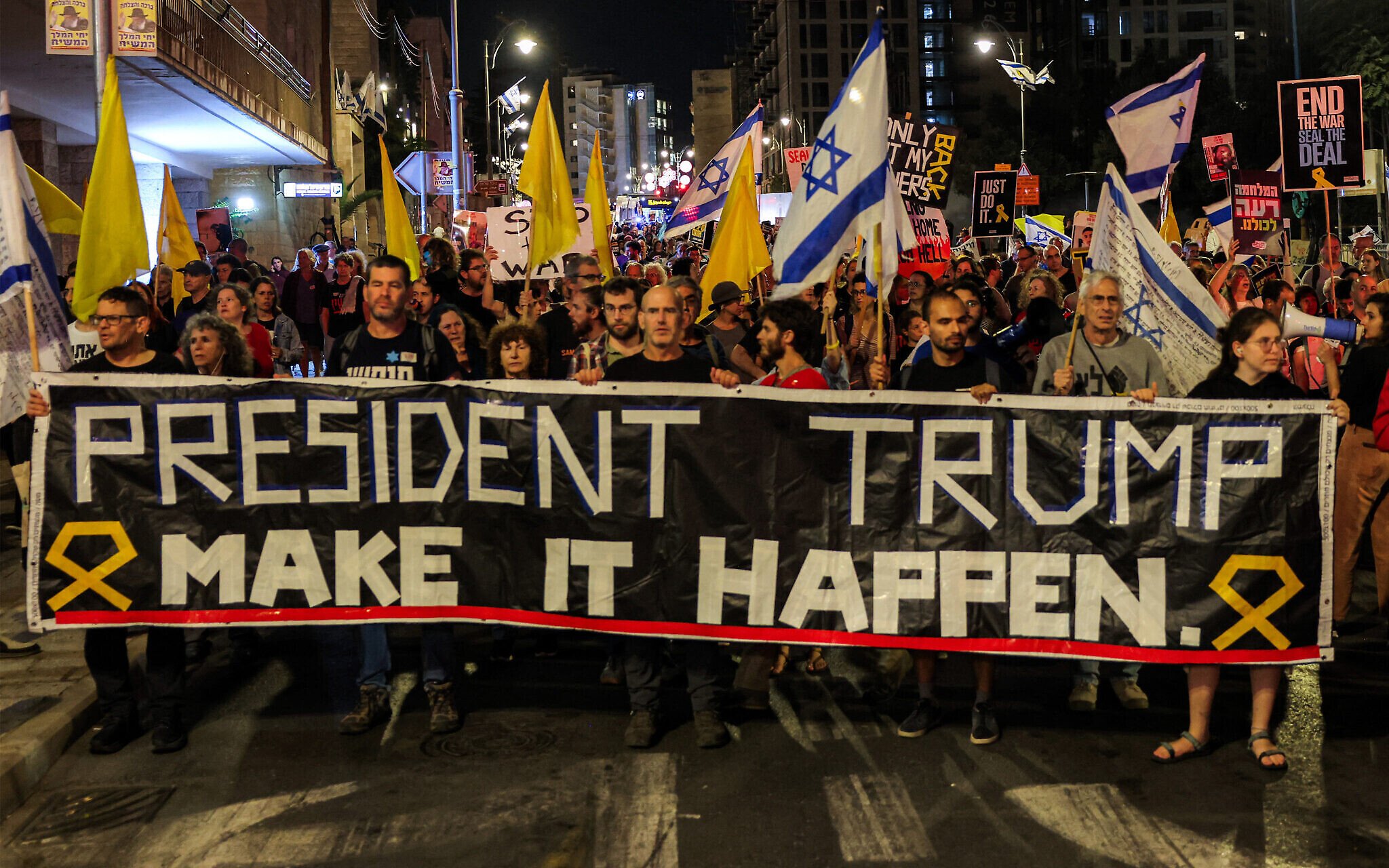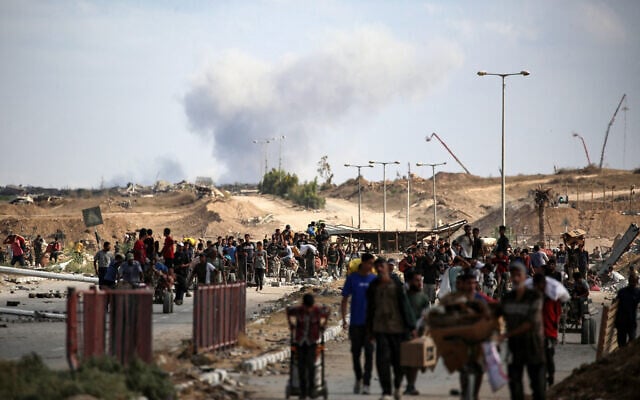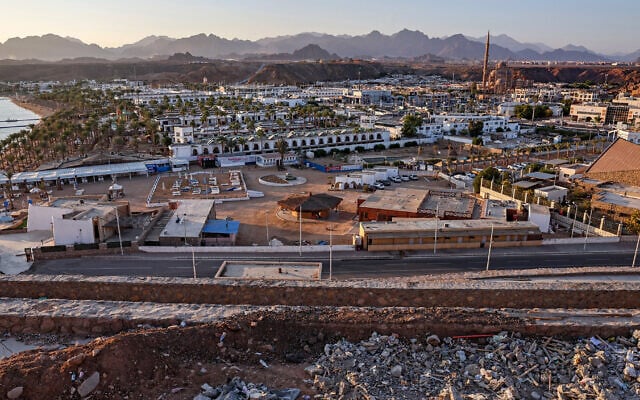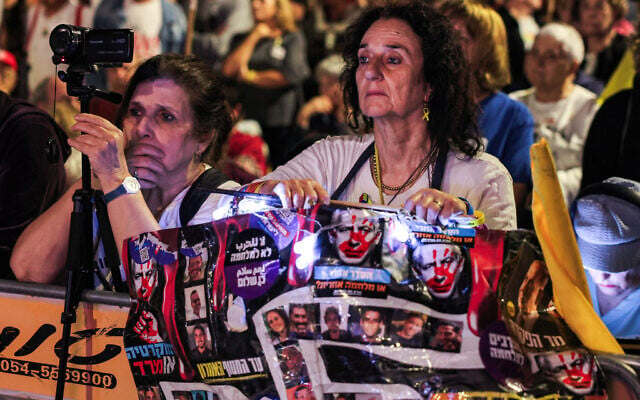


Israel and Hamas both signaled eagerness for a deal as their delegations prepared to meet in Egypt on Monday for talks over the US-backed plan to end the Gaza war.
Guarded optimism over an agreement also came from the relatives of hostages in Gaza, Muslim countries that are in contact with Hamas, and US President Donald Trump, who unveiled the 20-point plan to end the war last week.
But the negotiations may face obstacles: Hamas said it is prepared to release the hostages it is holding, but is expected to make additional demands regarding the Israeli military’s withdrawal from the Strip, and the terror group’s leadership is reportedly split over the deal. Prime Minister Benjamin Netanyahu is likewise working to quell opposition to the agreement within his own government.
On Sunday, Defense Minister Israel Katz echoed Netanyahu’s prediction that the hostages could be home in a matter of days, two years after they were taken captive in the October 7, 2023, attack that began the war.
“We may soon be informed of the return home of all our hostages, the living and the fallen alike, in accordance with the initiative of US President Donald Trump, at the end of which Hamas will be disarmed and the Gaza Strip will be demilitarized,” Katz said at a memorial ceremony for the Yom Kippur War. “We now expect the implementation of the first phase in the near future and the immediate release of all the hostages.”
A senior Hamas official on Sunday said the Palestinian terror group is motivated to reach an agreement to end the war and exchange the hostages it is holding for Palestinian security prisoners in Israeli custody.
“Hamas is very keen to reach an agreement to end the war and immediately begin the prisoner exchange process in accordance with the field conditions,” said the Hamas official, who was speaking anonymously as he was not authorized to speak on the matter.
He added, referring to Israel, “The occupation must not obstruct the implementation of President Trump’s plan. If the occupation has genuine intentions to reach an agreement, Hamas is ready.”
Trump, in a social media post on Saturday night, posted a map of a proposed initial Israeli withdrawal line that he said Israel had agreed to. The fighting would stop as soon as Hamas agrees, he wrote.
“When Hamas confirms, the Ceasefire will be IMMEDIATELY effective, the Hostages and Prisoner Exchange will begin, and we will create the conditions for the next phase of withdrawal, which will bring us close to the end of this 3,000 YEAR CATASTROPHE,” he wrote.
In another social media post, Trump shared a photo of a mass protest in Tel Aviv for a hostage deal, with demonstrators holding a huge sign reading, “It’s now or never.”
On Sunday, the foreign ministers of Qatar, Jordan, the UAE, Indonesia, Pakistan, Turkey, Saudi Arabia, and Egypt put out a joint statement praising Hamas’s “readiness” to meet key demands in the Trump proposal, expressing their support for an eventual full IDF withdrawal from Gaza and the return of the Palestinian Authority to the territory.
The diplomats welcomed “the steps taken by Hamas regarding US President Donald Trump’s proposal to end the war on Gaza, release all hostages, alive or deceased, and the immediate launch of negotiations on implementation mechanisms.”
Whether a deal will be had quickly, however, remains to be seen. Conflicting reports have emerged this week over whether Hamas will agree to the plan’s clauses, which would entail the group releasing all 48 hostages, disarming, and ceding control of Gaza.
On Saturday, The Wall Street Journal reported that Hamas’s political and military wings have not reached a consensus over the matter of disarmament, with Gaza-based commander Izz al-Din Haddad pushing for the group to retain “defensive” weapons such as assault rifles. Other officials from the terror group feel they won’t be able to enforce disarmament among the young men they have recruited throughout the war.
Channel 12 reported that Israeli negotiators plan to enter the talks with no intention of showing flexibility on the issue of disarming Hamas and demilitarizing the Strip, citing a source with knowledge of the talks.

Hamas’s focus in Monday’s talks, Palestinian officials said, is to nail down where Israel will withdraw to, and by when. According to Channel 12, the line demarcated in Trump’s post represents the Israeli position before Operation Gideon’s Chariots, an offensive earlier this year in which Israel conquered more than 70 percent of the Strip.
On Sunday, a Palestinian official said Hamas would “ask for a strict timetable for the Israeli withdrawal from Gaza. The first phase of talks will determine how things are going to proceed,” according to Reuters.
AFP reported, meanwhile, quoted a Palestinian source close to Hamas as saying that the talks would focus on “the timeline for preparing field conditions for the transfer of captives held in Gaza, as a prelude to launching the prisoner exchange process.”
The source added, “During communications with mediators, Hamas insisted that it is essential for Israel to halt military operations across all areas of the Gaza Strip, cease all air, reconnaissance, and drone activity, and withdraw from inside Gaza City.” He added that Hamas and other Gaza terror groups would likewise stop fighting.
The talks are expected to include discussions of maps to be provided by Israel showing withdrawal routes and timelines, which will coincide with the prisoner exchange process, the source said. The Hamas delegation will also present lists of Palestinian prisoners who must be released by Israel in return for the Israeli hostages, he says.
According to Trump’s plan, Israel is expected to release 250 Palestinian prisoners with life sentences and more than 1,700 detainees from the Gaza Strip who were arrested after October 7, 2023.

The Palestinian source told AFP that the two delegations will be in the same building when they convene for talks in the city of Sharm el-Sheikh in the Sinai Peninsula on Monday, but will be away from media coverage.
Saudi channel Asharq reported that Hamas leader Khalil al-Hayya, who is based in Qatar, will lead the Hamas delegation. According to the report, the delegation was set to arrive in Cairo on Sunday before heading to Sharm el-Sheikh.
Al-Hayya was targeted in an Israeli strike on Hamas leadership in Doha last month but survived along with other senior officials of the group. His son was killed in the strike, and he remained defiant in an interview that aired overnight, his first televised appearance since the attack.
“We hope that their blood will pave the way to victory, the way to Jerusalem, the way to the disgrace of the occupation, and the way to the dignity and triumph of the nation,” he said in the video aired by Al Araby Television Network in Qatar.
The Israeli negotiating team will be made up of Strategic Affairs Minister Ron Dermer, government hostage point man Gal Hirsch, Prime Minister Benjamin Netanyahu’s foreign policy adviser Ophir Falk, and senior officials from the Shin Bet and Mossad, a member of the team told The Times of Israel.
Back at home, Netanyahu met for two hours on Saturday with National Security Minister Itamar Ben Gvir, the Walla news site reported. Ben Gvir, who leads the far-right Otzma Yehudit party, said on Saturday night that his faction will leave the government if Hamas “continues to exist” after the return of the hostages held in Gaza. Far-right Finance Minister Bezalel Smotrich was also reportedly present for some of the meeting.
Both ministers have vocally advocated for Israel to control Gaza and reestablish settlements there, which Trump’s proposal precludes. Opposition parties have pledged a majority in the Knesset for the deal if Smotrich and Ben Gvir withdraw their parties from the coalition in protest.

Relatives of hostages, including some released, meanwhile, were hoping that the remaining 48 hostages —some 20 of whom are thought to be alive — would return.
Yael Adar, the mother of slain hostage Tamir Adar, told 103FM radio that she believes Trump will succeed in pushing a deal over the finish line, but is still anxious.
“These passing hours are filled with turmoil and anxiety,” she said. “This is now the real test of whether this is real.”
Sylvia Cunio, mother of hostages Ariel and David Cunio, said she is already envisioning their reunion.
“I really hope I’ll see them this week, I’m dreaming of the moment I hug them and we can be together, eating together, laughing,” she said.
Former hostage Keith Siegel, who was freed in February, said he learned the hard way not to rely on predictions of hostages being released, recounting that when his wife Aviva was let go in a ceasefire in November 2023, he was told he would be freed the next day.
“I’m optimistic, but together with that, the optimism is cautious. There were times in my captivity when there were talks and it seemed that I would soon be released,” he told Channel 12. “I’ve learned until they are all home, it’s not over.”

